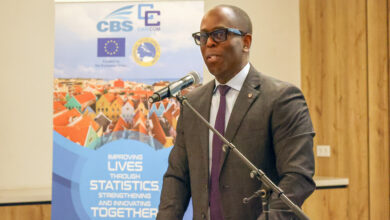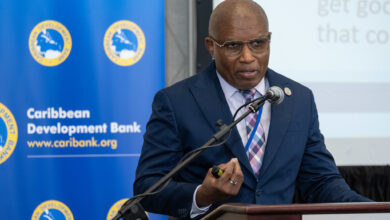(CARICOM Secretariat, Turkeyen, Greater Georgetown, Guyana) More than 30 senior officials with responsibility for Information and Communication Technologies (ICTs) in the Caribbean Community (CARICOM) along with development partners, knocked heads and hands together to fine-tune short, medium and long term strategic actions distilled from the five strategic objectives of the comprehensive draft Implementation Plan for the CARICOM Regional Digital Development Strategy (RDDS).
This strategy is pivotal in facilitating a coordinated regional approach to improving ICT in the Region and to use ICT as a critical development tool to transform the region into an information and knowledge society. The two-day meeting, organized by the CARICOM Secretariat with support from the 9th European Development Fund was held at Grenadian by Rex Resorts in St George’s Grenada on Thursday and Friday.
The Meeting’s resolve to complete on the first day, one of two of major tasks set before them, was fueled by the charge delivered by the Officer in Charge of Trade and Economic Integration, CARICOM Secretariat, Ms Desiree Field Ridley. She impressed upon participants the importance of ICT to the sustainable livelihood of the peoples of the Caribbean Region, especially the well-being and development of youth.
Pointing to ICT as one of the main drivers of economic recovery in the present global crisis, Ms Field-Ridley noted that ICTs stimulated innovation by encouraging the creation and development of new ideas, product and services. Technology, she observed, was advancing at such a rapid pace that innovations could quickly become archaic “in these exciting times of connectivity.” The Caribbean, she stated, was constantly playing “catch-up,” while other rapidly developing countries were maximizing use of the technology to emerge from the doldrums of the global economic crisis.
In this context therefore, Ms Field-Ridley underscored the urgency of completing the draft implementation plan for the regional ICT strategy and also stressed the importance of developing the framework for a regional broadband policy which was the second task to be tackled by the ICT officials on Day Two of their meeting. Under the watchful chairmanship of Ms. Thea Smith, Suriname’s Deputy Permanent Secretary – Ministry of Communications, the meeting combed through each strategic objective linked to the RDDS, ensuring that all areas were covered with accompanying actions in the short, medium and long term. In frank and open discussions, they amended and re-worded actions to meet the objectives of the RDDS.
The first strategic objective focused on establishing appropriate infrastructure and regulatory frameworks to create easy and affordable access to technology. The second objective emphasized capacity building in ICT in an effort to promote culture, improve lifestyle and enhance economic value. The third spoke to information management and the imperative of creating and sustaining a culture of innovation and quality through the use of ICTs in order to enable sustainable production of Regional digital goods and services, the development of cultural industries and the inclusion of local content in delivery of information. Strategic Objective Four underscored the need to manage and use ICT to demonstrate good governance and increased efficiency in the Region’s operations. The fifth objective is also inextricably linked with the fourth and addressed the issue of guiding businesses and governments to use ICT for sustainable growth and support social development objectives through partnerships that use networked technologies.
In distilling the actions for realizing each objective, the Meeting also identified relevant collaborating and implementing partners who would take the lead on each category of actions. The issue of financing the implementation of the strategy as well as the crucial issue of monitoring and evaluating the implementation plan was also addressed. The first day of the meeting was therefore concluded with a sense of satisfaction that the Draft implementation Plan for the RDDS should be ready for submission to CARICOM Heads of Government at their next regular meeting in July.
However, as Ms Field-Ridley pointed out, the business of advancing the Region through ICT could not be over until the Community addressed the thorny issue of Broadband access. She acknowledged the major challenges that the Caribbean faced in keeping pace with rapid technological advances and managing the costs of increased access to high speed internet. However she was resolute that notwithstanding those challenges, there was a need to act with urgency in addressing the broadband crisis in order to ensure more effective and efficient application of ICTs to regional development.
Recognizing the importance of Broadband access, the United Nations at a meeting in Geneva in October set a series of targets that required each country to develop a Broadband policy by 2015 and to make broadband access available at less than 5% of monthly income for developing countries. Currently, the Region’s Broadband penetration stands at a miniscule 28. 2%; with just over 11 million Internet users, 6 million of which are Facebook users. In order to address a slew of the Caribbean’s development needs, including the creation of knowledge-based society, ICT-based industries, better governance, access to quality education, connected communities and of course achieving functional integration, Broadband access is therefore an imperative, Ms Field-Ridley added.
She reminded the Meeting that CARICOM had to be results-oriented in keeping with its new thrust. “ICT, including broadband, is one area in which we can create an impact,” she added. “It is now our task to convince the Conference on what needs to be done,” she concluded. The final presentation on Thursday afternoon made a compelling case for increased Broadband access in the Caribbean. The presentation paved the way for the Meeting to tackle its second task on Friday morning: Discussion on critical elements of a proposed Regional Broadband Policy.





